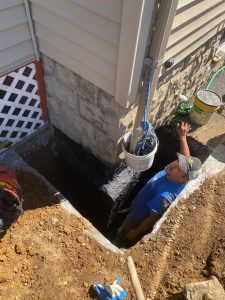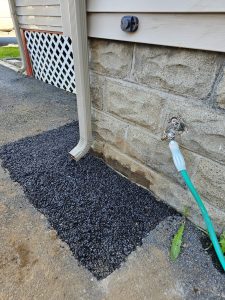Choosing a basement waterproofing contractor isn’t as straightforward as it seems. You’ve got to dig into their qualifications, inspect their previous work, and compare their estimates. But how do you decide what’s essential and what’s not? How do you make sure their work will stand the test of time? Can you trust their guarantee? It’s a lot to think about. Stay tuned as we break down what to look for in your search for a reliable and competent basement waterproofing contractor.
Key Takeaways
- Consider professional expertise, ensuring the contractor has relevant training, licenses, and insurance for basement waterproofing.
- Evaluate past work and reliability through references, case studies, and online reviews, focusing on similar projects.
- Assess the contractor’s professionalism and communication skills, including promptness, respectfulness, and clarity.
- Scrutinize contracts for clear terms, project scope, payment schedules, and provisions for changes or delays.
- Request detailed cost estimates, understand warranty terms, and inquire about post-work services for ongoing basement maintenance.
Understanding Basement Waterproofing
 Every homeowner should possess a fundamental understanding of basement waterproofing. It’s not just about guarding against minor leaks or seepage in your home’s foundation. You’re also protecting your property from major problems like structural damage, mold growth, and decreased property value.
Every homeowner should possess a fundamental understanding of basement waterproofing. It’s not just about guarding against minor leaks or seepage in your home’s foundation. You’re also protecting your property from major problems like structural damage, mold growth, and decreased property value.
Now, basement waterproofing might sound like a simple process, but it’s more complex than you’d think. It involves several steps, starting with identifying the source of the moisture. This could be due to condensation, runoff, or groundwater swelling, each of which requires different treatment methods.
Next, you’ll need to select the appropriate waterproofing method. You’ve got several options, from interior sealants and exterior waterproofing to drainage systems and more. It’s crucial to choose the right one based on your basement’s specific needs and the severity of the water problem.
Importance of Professional Expertise
In tackling basement waterproofing, relying on professional expertise is a decision you won’t regret. The intricate process demands a level of skill and experience that’s hard to match without the right training.
Professionals have a wealth of knowledge in identifying the root cause of water issues, from foundational cracks to inadequate drainage systems, and have the know-how to address them effectively.
You may be tempted to opt for a DIY approach or hire a handyman to save on costs. However, keep in mind that waterproofing isn’t a task you want to cut corners on.
Poor execution can lead to significant damage, requiring expensive repairs down the line. It’s not just about patching up visible leaks; it’s about implementing a thorough solution that protects your basement from future issues.
An experienced contractor is equipped with the resources and expertise to deliver high-quality, durable results. They’re familiar with the latest techniques and products in the industry, ensuring your home benefits from the best available solutions.
Your home is a significant investment, and entrusting its care to a professional isn’t something you’ll regret. In the long run, professional expertise saves you time, money, and stress.
Verifying Credentials and Certifications
While recognizing the value of a professional’s expertise is a good first step, this is only a part of the selection process. You also need to verify the contractor’s credentials and certifications. It’s crucial to verify that they have the necessary qualifications to perform basement waterproofing.
| Credential/Certification | Why It’s Important |
|---|---|
| State License | To legally operate, contractors must possess a state license. It’s an indication of their compliance with local regulations and standards. |
| Insurance | This protects you from potential liabilities during the project. An insured contractor means you’re not financially responsible for any accidents or damages. |
| Specific Training | Basement waterproofing requires specialized skills. Relevant training or certification indicates their proficiency in this area. |
Do not hesitate to ask for proof of these credentials. A reputable contractor won’t hesitate to provide them. You can also confirm their licensing status with your local government agency. Remember, you’re entrusting them with your home’s safety and value. Don’t compromise by choosing a contractor without the necessary credentials or certifications. This may seem like a tedious step, but it’s a crucial one in verifying the quality and success of your waterproofing project.
Evaluating Previous Work Quality
You’ve checked their credentials, now it’s time to inspect the quality of a contractor’s previous work.
Look closely at their past projects, assess the standards of quality they adhere to, and consider the real-world performance of their waterproofing solutions.
This evaluation will give you valuable insight into the durability and effectiveness of their work, and help inform your decision.
Analyzing Past Projects
Before you settle on a contractor, it’s critical to analyze their past projects to evaluate the quality of their previous work. This isn’t just about seeing pretty before-and-after photos. You’ll want to dig deeper. Ask for case studies or references from past clients. If possible, visit a recently completed project to see the contractor’s work firsthand.
Look for signs of professionalism and attention to detail. Did the contractor complete the project on time and within budget? Were there any issues during the project, and if so, how were they resolved? This type of information can give you invaluable insights into the contractor’s work ethic and problem-solving skills.
Also, consider the scale and complexity of the past projects. If your basement needs extensive waterproofing, you’ll want a contractor who’s handled similar jobs in the past. A contractor who’s only done minor repairs may not have the necessary experience for a larger project.
Lastly, don’t forget to check online reviews. They can provide an unbiased view of the contractor’s performance. Remember, a single bad review isn’t necessarily a deal-breaker, but a pattern of negative feedback should raise a red flag.
Quality Standards Assessment
Having examined the contractor’s past projects, it’s time to evaluate the quality of their work. This isn’t a cursory glance; you’re appraising the standard of their craft. Did they adhere to industry-approved waterproofing methods? How did they handle unexpected issues?
Consider the following table when evaluating previous work quality:
| Quality Indicator | Observation |
|---|---|
| Use of materials | Did the contractor use high-quality, durable materials? |
| Technique | Was the work performed using industry-approved methods? |
| Problem-solving | How did they handle unexpected issues during the project? |
| Finish | Was the job completed neatly, with attention to detail? |
| Longevity | Did the waterproofing stand the test of time, showing no signs of leakage or dampness? |
Real-World Performance Evaluation
Evaluating a basement waterproofing contractor’s real-world performance provides a clear picture of the quality you can expect. This means looking at the contractor’s past projects, their overall success rate, and how satisfied their previous clients are with their work.
Don’t hesitate to ask for references, and more importantly, take the time to follow up on them. Speak with past clients to get first-hand accounts of their experiences. Inquire about the contractor’s professionalism, timeliness, and their ability to stay within budget. Was the contractor able to address any unexpected issues promptly and effectively?
Remember to also check online reviews. These can offer a broader perspective, but be cautious. Make sure to distinguish between genuine customer reviews and promotional content. Also, don’t let a single negative review sway your decision. Instead, look for patterns in the feedback.
Lastly, consider the contractor’s portfolio of completed projects. This can provide insights into the types of basements they’ve worked on, their design aesthetics, and their problem-solving skills.
Keep in mind, the right contractor will have a proven track record that demonstrates their ability to deliver quality work consistently.
Checking Customer Reviews and Testimonials
One of the most effective ways to gauge the reliability of a basement waterproofing contractor is by checking customer reviews and testimonials. Such feedback offers firsthand insights into their work quality, reliability, and overall customer satisfaction. However, don’t just skim through the star ratings. Dig deeper into the written testimonials to understand the contractor’s strengths and weaknesses.
Consider the following table as a simple guide for interpreting reviews and testimonials:
| Rating | Quantity | Content |
|---|---|---|
| High | Many | Positive reviews highlighting promptness, quality work, and professionalism |
| Medium | Few | Mixed reviews with some minor complaints about delays or minor quality issues |
| Low | Few | Complaints about poor workmanship, delays, or poor communication |
Look for patterns in the reviews. If many customers are praising the contractor’s promptness, it’s a good sign. However, if multiple reviews mention poor workmanship, that’s a red flag. Remember, a few bad reviews aren’t necessarily a deal-breaker, as long as they aren’t a consistent pattern.
Lastly, verify that the reviews and testimonials are from legit sources. Websites like Better Business Bureau and Angie’s List can provide reliable feedback. So, do your homework before making the final decision.
Assessing Communication and Professionalism
While you’re in the process of choosing a basement waterproofing contractor, it’s important to assess their communication skills and overall professionalism.
How a contractor communicates with you can give you a clear insight into their work ethics and professionalism. Do they promptly return your calls? Are they open to answering your queries and are they clear in their explanations? Good communication is paramount to ensuring that the job is done to your satisfaction. If they can’t communicate effectively, they may not understand your specific needs and expectations.
Professionalism goes beyond communication. Look at their punctuality, respectfulness, and their ability to keep their work area clean and organized.
It also includes how they present themselves, from their attire to the manner in which they handle their tools and equipment.
Furthermore, a professional will always be ready to provide you with clear, written contracts and will respect the terms within. They uphold industry standards and are committed to delivering high-quality work.
Comparing Cost Estimates
After you’ve scrutinized the contractor’s communication and professionalism, your next step should be to compare cost estimates. Don’t be afraid to request multiple bids from different contractors. This practice doesn’t just help you get the best price, it also allows you to gauge the market average, which is vital in avoiding overpriced estimates.
While comparing costs, it’s essential not to sacrifice quality for a lower price tag. The most affordable bid mightn’t provide the thorough service your basement needs. Remember, you’re investing in a long-term solution to safeguard your home against water damage. Therefore, prioritize the value of the service over the initial cost.
Additionally, be aware of what’s included in the estimates. A low-cost estimate might seem attractive initially, but if it doesn’t cover all the necessary materials, labor, and other expenses, you could end up paying more in the end.
It’s also wise to ask if the estimate includes any warranty or guarantee. A reputable contractor will stand by their work and offer some form of warranty.
In the end, making an informed decision based on both price and quality can save you from potential headaches down the road.
Understanding the Contract Details
Having closely examined the cost estimates, your next move involves getting to grips with the contract details. Don’t be afraid to ask for explanations about any term or clause that you don’t understand. After all, this contract will be governing the entire project, so it’s essential you fully grasp what’s involved.
Firstly, the contract should clearly outline the scope of work. This includes the specific tasks to be performed, the materials to be used, and the schedule for completion. Make sure that there aren’t any vague or ambiguous terms that could lead to misunderstandings later on.
Secondly, the contract should specify the payment terms. This includes the total cost, the down payment, and the schedule for subsequent payments. Be skeptical of contractors who demand full payment upfront; it’s not the industry standard.
Finally, the contract should include provisions for changes or delays. What happens if the project hits a snag or needs to be modified? Who bears the extra costs? These potential issues should be addressed in the contract to protect both parties.
Understanding the contract details is an important step in choosing the right basement waterproofing contractor. It’s a document that shouldn’t be glossed over or rushed through.
Warranty and Post-Work Services
Once you have a firm grasp on the contract details, it’s time to explore the specifics of the warranty and any post-work services offered by the basement waterproofing contractor. A warranty serves as your protection against subpar workmanship and materials.
Make sure you understand the terms, length, and coverage of the warranty. Ideally, it should cover both labor and materials for a significant period.
Don’t overlook post-work services either. These often include regular inspections and maintenance, which are essential to keep your basement dry.
Look for a contractor who offers these services as part of the package, instead of as an extra charge.
When reviewing these aspects, don’t hesitate to ask questions. If a contractor isn’t willing to provide a thorough warranty or follow-up services, it might be a red flag.
You’re investing in the longevity of your home, and you deserve assurance that the work will stand the test of time.
Frequently Asked Questions
What Is the Average Timeframe for a Basement Waterproofing Project?
You’re asking about the average timeframe for a basement waterproofing project. Typically, it can take 1-2 days, but it’s contingent on the project’s size, the contractor’s efficiency, and the specific waterproofing method you’ve chosen.
Do You Offer Financing Options or Payment Plans for Your Services?
Yes, you’ll find that many contractors offer financing options and payment plans. It’s important to discuss this upfront to guarantee their terms fit your budget. Always read the fine print before finalising any agreement.
Will the Waterproofing Process Cause Any Disruption to My Daily Routines?
Yes, some disruption might occur during the waterproofing process. However, a professional contractor will work efficiently to minimize this. It’s best to discuss specific timelines and potential disruptions with your chosen contractor in advance.
How Do I Maintain the Waterproofing System After Its Installed?
After it’s installed, you’ll need to regularly clean your drainage channels and inspect for cracks. You should also check the sump pump for functionality. If you spot any issues, contact your contractor immediately.
What Are the Potential Risks or Side Effects of Basement Waterproofing?
You might encounter increased humidity, foundation damage, or mold growth if basement waterproofing is done incorrectly. It’s essential you’re aware of these risks to guarantee you hire a competent contractor for a proper job.
Choosing the right basement waterproofing contractor can seem intimidating, but armed with these tips, you’re ready to make an informed decision. Imagine this: John chose a contractor based on credentials, past work quality, and excellent reviews. He enjoyed clear communication, a detailed contract, and a robust warranty. As a result, his basement is now watertight, enhancing his home’s value and his peace of mind. That’s the power of diligent contractor selection. So, start your search today!
